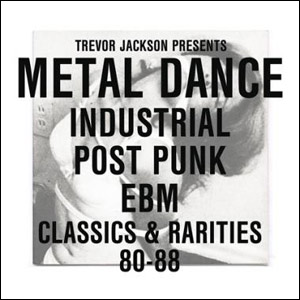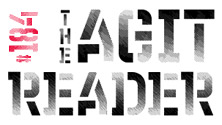
Metal Dance
Industrial, Post Punk, EBM Classics & Rarities ’80–’88
Strut
Anyone who tells you that music in the ’80s (or any decade for that matter) sucked clearly has never done much digging beyond the twaddle that littered American airwaves at the time (though some of that was good too). In the aftermath of the punk explosion of the ’70s, the first half of the decade was rich with artists who seemingly thought anything was possible. Indeed, many of punk’s prime movers went on to other more esoteric projects in the subsequent decade. Moreover, with synthesizers and drum machines becoming increasingly more common place, the tools available allowed the number of possibilities to explore to multiply exponentially.
In many ways, the ’80s can be seen as rock & roll’s post-modern era, with the pop form being refashioned in a myriad of ways. The idea of genre became increasingly meaningless as artists continually meshed together bits and pieces ranging from funk to reggae to avant garde electronica. One such loose sphere was “Electronic Body Music,” a descriptor coined by Kraftwerk’s Ralf Hütter to categorize an emerging strain of sounds that was danceable, but which was influenced by Throbbing Gristle and not the Village People. It is this niche that is the focus of Metal Dance: Industrial, Post Punk, EBM Classics & Rarities ’80–’88, a two-disc compilation curated by producer and Output Recordings found Trevor Jackson.
While the album begins curiously with “The Bubblemen Are Coming,” a jazzy track Love & Rockets made under The Bubblemen pseudonym, the rest of the set sticks to an aesthetic of icy synths paired to stark mechanized beats. It seems entirely appropriate that tracks such as Buzzcock Pete Shelley’s “Witness the Change” are labeled as dub versions, as their sparse, beat-heavy instrumentation is not unlike that style. And while the difference between Analysis’ “Surface Tension” and the more popular work of the band’s new wave brethren may seem negligent, what is not there makes a world of difference. With each oscillating note rendered in sharp relief, the cut (and many others on the record) can be seen, er, heard in terms of negative and positive space or, perhaps, 1s and 0s. That approach is most evident on Hard Corps’ “Je Suis Passee (Dub),” which comprised almost entirely of lazerbeam notes and bass throbs, seems more program than song.
Even when Jackson’s mix ventures into denser territory, there is still a sharp-edged harshness to maintain the austerity. Nitzer Ebb’s “Control I’m Here (Clouston’s Controlled Edit)” is delivered with teeth bared, while Alien Sex Fiend’s “Under the Thunde (Ignore the Dub)” is cut through with buzzsaw guitar. “Seconds Too Late” by Cabaret Voltaire, who probably are the prototype for Metal Dance’s overarching sonics, is steely even in its lyrical admonishments. There is a polarity at work here that constantly keeps things in high-contrast. The record ends with the post-punk world funk of 23 Skidoo’s “Coup,” a fitting disjointed amalgamation of the shards of influence filtered throughout the album’s other 26 cuts. Metal Dance is a vivid reflection of the creativity that coursed through the ’80s, however distant from the mainstream it may have been.
Stephen Slaybaugh
PAST PERFECTS
Karen Dalton, 1966
Mighty Sparrow, Sparrowmania! Wit, Wisdom and Soul from the King of Calypso 1962-1974
Gaunt, I Can See Your Mom from Here
Alex Chilton, Free Again: The "1970" Sessions
The Lucy Show, Remembrances
Boddie Recording Company: Cleveland, Ohio
Smashing Pumpkins, Gish and Siamese Dream
U2, Achtung Baby
Can, Tago Mago
Leonard Cohen, The Complete Albums Collection
The Smiths, Complete
Void, Sessions 1981-83
Fac. Dance: Factory Records 12" Mixes & Rarities 1980-1987
Gregory Isaacs, The Ruler: 1972-1990
